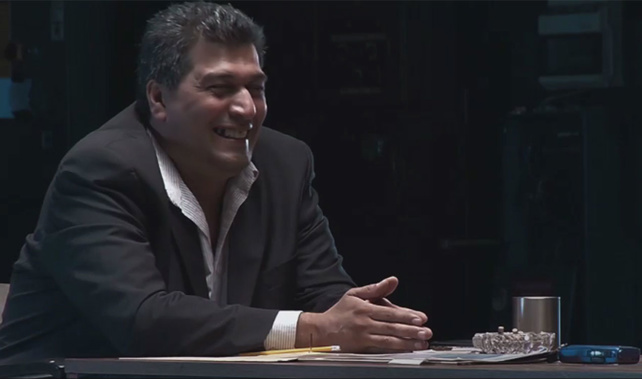
Director: Matthais Bittner
3/5
An Iraqi defector named Rafed Ahmed Alwan al-Janabi (codename ‘Curveball’) rests his elbows on the steel table. All of the indignancy that animated him throughout the film vanishes. He stares at the off-screen interrogator, considering the question.
“When you see the chaos and your destroyed homeland,” the disembodied voice of writer and director Matthais Bittner asks, “are you ashamed of your lie?”
“Should I be honest?” Rafed replies. “Yes.”
War of Lies is the tense retelling of an informant’s dishonesty and whether one man ought to shoulder the guilt for a liberation turned catastrophe.
Curveball’s mostly falsified evidence – that Saddam Hussein was still manufacturing chemical and biological weapons until the early 2000s – would become the central jigsaw puzzle piece which tied together the case for the 2003 intervention in Iraq. The information would appear in 112 US reports on Iraq, and famously in Colin Powell’s February 2003 address to the UN. The British government would ignore David Kay’s insistence of inconsistencies in the story.
At its heart, this documentary has all the mystery and motive of John Le Carre’s best literary work, though with very tangible real-world consequences.
The film’s central interview is spliced between point-of-view re-enactments which push the story forward. In these handheld set-pieces each character is given a name but no face. Rafed’s wife is never seen. The asylum officers and intelligence agents are simply shirtsleeves or shadowy spectres. When Rafed begins to fear Baathist death squads want him dead, paranoia sets in. The breathing behind the camera becomes shallower. Curtains are peered through as black-hatted silhouettes patrol orange-lit streets.
Brittner’s technique is a welcome relief from the typical talking-head documentary format. The endless exposition is disappeared and replaced with near-silent scenes rendered taught with suspense.
Swapping between interviews, set-pieces, and occasional news bulletin montages, the story unravels.
Rafed, arriving as a defector in Germany in 1999, gets ‘carrot and stick’ from the asylum office. Stowed away with eight other migrants, the protagonist receives no special treatment until he mentions his degree in chemical engineering from a Baghdad University.
The ‘stick’ very quickly becomes a ‘carrot’. Rafed is bumped up to rooms all to himself. He divulges more falsehoods about various chemical plants which leads to an apartment upgrade. Once the UN inspectors show up at the plant and find nothing to corroborate the tale, Rafed recycles Saddam’s notorious reputation for cat-and-mouse concealment tactics.
The chemicals and biological weapons facility is actually mobile, he claims, spread across three trucks. They’re able to disappear into the desert whenever needed. (It should be noted that Rafed is not far from the mark: Saddam buried entire squadrons of fighter jets in sand dunes to avoid inspectors’ sanctions, and ordered an entire nuclear warehouse bulldozed and rebuilt with a few days. As always, he got his wish.)
Those infamous roving labs later become central to the American case for regime change in Iraq. Most remarkably the Americans, not long after the invasion, ‘produced’ two of three non-existent trucks. Rafed’s deception is complete.
However, having Curveball on camera – all toothy grins and gesticulation – allows for the other end of the moral equation which Bittner seems entirely reluctant to include.
Rafed very early on highlights two important points often lost in the prevailing anti-war narrative (Bittner’s clear ideological base): that Saddam Hussein and his quarter-decade regime needed to be ended, and war was going to inevitable because of it.
When Bittner confronts Rafed with the images of a bloodied child after Saddam’s downfall, he delivers his own return serve. What about the horrible necessity of sanctions, and corrupt oil-for-food programme? What about Halabja in 1988, where 5000 civilians were gassed to death in a single afternoon? He goes further, arguing that for the Iraqi diaspora, there was always going to be a price for a tyranny overthrown.
This arrives closer to the single largest problem of War of Lies. Under a different title (perhaps Culture of Lies?) Bittner might’ve have turned his eye on just why the Germans, the Americans, and the British entertained Rafed’s fantasies for so long. The questions dangle unattended: Why use a fantasy as the cornerstone for an action which was justifiable without it? Was Curveball’s evidence simply the trigger on what was already a plan in action? Was it post-hoc justification?
The depth and breadth of the intelligence community’s failure goes untroubled because Bittner, it seems, wants to see Rafed squirm. He wants Curveball humiliated in the public eye.
He could’ve succeeded, too. Bittner, for most of what is an otherwise gripping film, keeps dealing out more and more rope which Rafed can hang himself with. But by pushing an Iraqi defector into a sensitive area, the director’s prejudice is exposed.
Go and live for a day under Saddam’s regime, Rafed implies, and tell me you wouldn’t have done the same thing.
War of Lies is showing at the Documentary Edge Festival.
Take your Radio, Podcasts and Music with you









